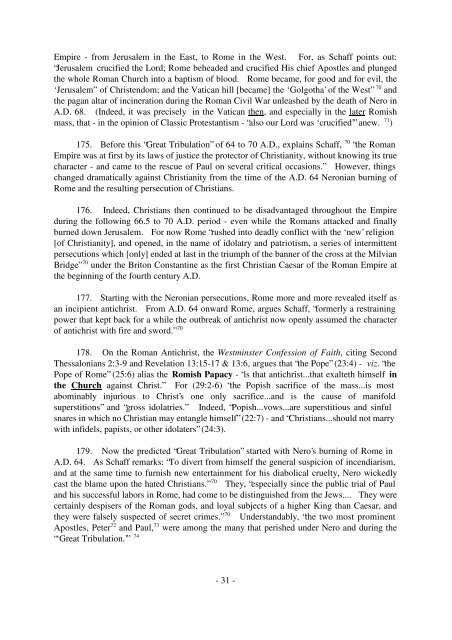JERUSALEM; ROME; REVELATION - The Preterist Archive
JERUSALEM; ROME; REVELATION - The Preterist Archive
JERUSALEM; ROME; REVELATION - The Preterist Archive
You also want an ePaper? Increase the reach of your titles
YUMPU automatically turns print PDFs into web optimized ePapers that Google loves.
Empire - from Jerusalem in the East, to Rome in the West. For, as Schaff points out:<br />
“Jerusalem crucified the Lord; Rome beheaded and crucified His chief Apostles and plunged<br />
the whole Roman Church into a baptism of blood. Rome became, for good and for evil, the<br />
‘Jerusalem” of Christendom; and the Vatican hill [became] the ‘Golgotha’ of the West” 70 and<br />
the pagan altar of incineration during the Roman Civil War unleashed by the death of Nero in<br />
A.D. 68. (Indeed, it was precisely in the Vatican then, and especially in the later Romish<br />
mass, that - in the opinion of Classic Protestantism - “also our Lord was ‘crucified’” anew. 71 )<br />
175. Before this “Great Tribulation” of 64 to 70 A.D., explains Schaff, 70 “the Roman<br />
Empire was at first by its laws of justice the protector of Christianity, without knowing its true<br />
character - and came to the rescue of Paul on several critical occasions.” However, things<br />
changed dramatically against Christianity from the time of the A.D. 64 Neronian burning of<br />
Rome and the resulting persecution of Christians.<br />
176. Indeed, Christians then continued to be disadvantaged throughout the Empire<br />
during the following 66.5 to 70 A.D. period - even while the Romans attacked and finally<br />
burned down Jerusalem. For now Rome “rushed into deadly conflict with the ‘new’ religion<br />
[of Christianity], and opened, in the name of idolatry and patriotism, a series of intermittent<br />
persecutions which [only] ended at last in the triumph of the banner of the cross at the Milvian<br />
Bridge” 70 under the Briton Constantine as the first Christian Caesar of the Roman Empire at<br />
the beginning of the fourth century A.D.<br />
177. Starting with the Neronian persecutions, Rome more and more revealed itself as<br />
an incipient antichrist. From A.D. 64 onward Rome, argues Schaff, “formerly a restraining<br />
power that kept back for a while the outbreak of antichrist now openly assumed the character<br />
of antichrist with fire and sword.” 70<br />
178. On the Roman Antichrist, the Westminster Confession of Faith, citing Second<br />
<strong>The</strong>ssalonians 2:3-9 and Revelation 13:15-17 & 13:6, argues that “the Pope” (23:4) - viz. “the<br />
Pope of Rome” (25:6) alias the Romish Papacy - “is that antichrist...that exalteth himself in<br />
the Church against Christ.” For (29:2-6) “the Popish sacrifice of the mass...is most<br />
abominably injurious to Christ’s one only sacrifice...and is the cause of manifold<br />
superstitions” and “gross idolatries.” Indeed, “Popish...vows...are superstitious and sinful<br />
snares in which no Christian may entangle himself” (22:7) - and “Christians...should not marry<br />
with infidels, papists, or other idolaters” (24:3).<br />
179. Now the predicted “Great Tribulation” started with Nero’s burning of Rome in<br />
A.D. 64. As Schaff remarks: “To divert from himself the general suspicion of incendiarism,<br />
and at the same time to furnish new entertainment for his diabolical cruelty, Nero wickedly<br />
cast the blame upon the hated Christians.” 70 <strong>The</strong>y, “especially since the public trial of Paul<br />
and his successful labors in Rome, had come to be distinguished from the Jews.... <strong>The</strong>y were<br />
certainly despisers of the Roman gods, and loyal subjects of a higher King than Caesar, and<br />
they were falsely suspected of secret crimes.” 70 Understandably, “the two most prominent<br />
Apostles, Peter 72 and Paul, 73 were among the many that perished under Nero and during the<br />
“‘Great Tribulation.’” 74<br />
- 31 -
















